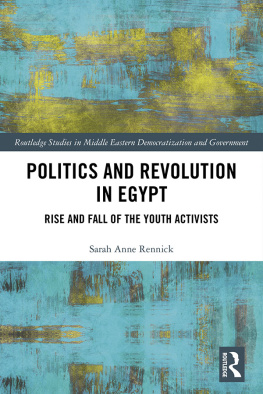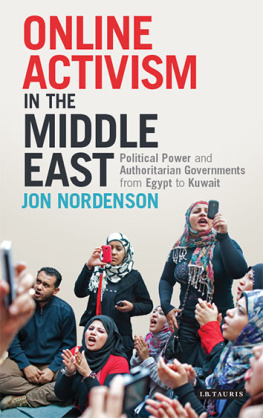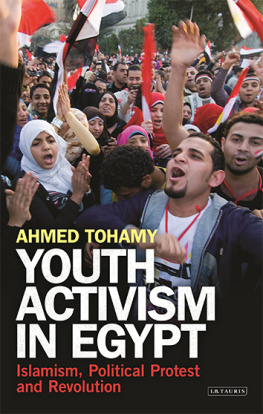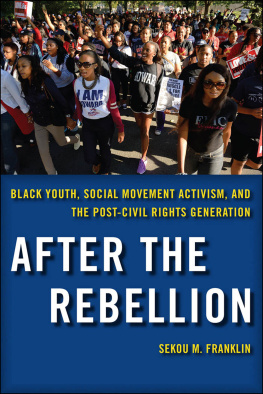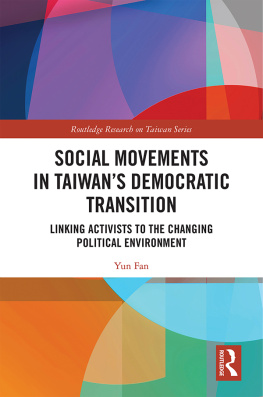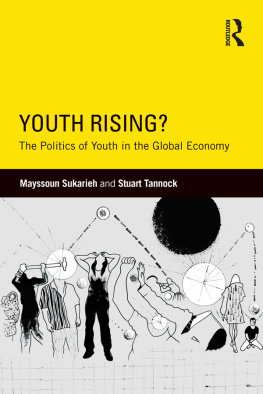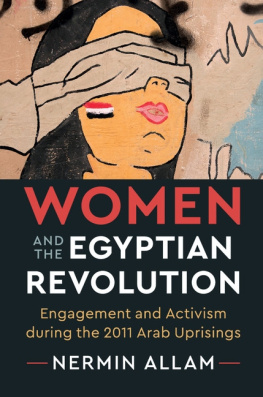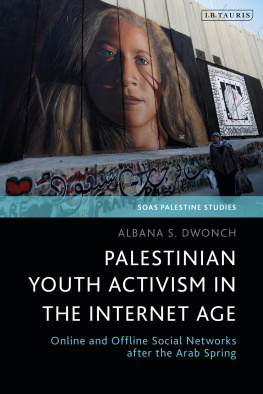Politics and Revolution in Egypt
In the years since the 2011 revolutions, Egypt and the Arab countries in general have moved from a profound moment of hope and democratic potential to deepened authoritarianism and outright war. Among the many political actors who have seen their political prospects rise and fall are youth activists, the revolutionary vanguard who spearheaded the transition process.
This book offers a detailed analysis of Egypts revolutionary youth as a collective and non-institutionalized political actor since 2005, bringing forth in particular the organizational, ideational, and strategic dimensions of the social movement. It offers insights into the origins of the movement and its evolution over time, the activists claims and objectives, and the rationale behind their actions/interactions in the greater political arena. Proposing a theoretical framework that lies at the nexus of practice theory and social movement theory, the book demonstrates how the foundational practices of youth and revolutionary acted as the movements internal culture, shaping the activists claims and goals, their organizational structures, and their choice of strategies and repertoires of contention. In the context of a defunct Arab Spring and the regions descent into deepened authoritarianism and ultra-violent conflict, the book sheds light on the Egyptian uprising and the reasons for its increasingly grim outcome by providing a detailed analysis of one of its key players and both the exogenous and endogenous reasons why the revolutionary youth activists failed to achieve their goals.
As the first book to assess the revolutionary youth as a social movement distinct from other forms of activism and other youth groups/parties in Egypt, it will be a valuable resource for anyone with an interest in Middle East Studies, the Arab Spring, or social movements more generally.
Sarah Anne Rennick is a researcher at the Arab Reform Initiative in Paris, France. Her research focuses on social movements in the Middle East, analytical concepts of youth and new forms of youth engagement, and peace processes in the MENA zone.
Routledge Studies in Middle Eastern Democratization and Government
Edited by: Larbi Sadiki
Qatar University
This series examines new ways of understanding democratization and government in the Middle East. The varied and uneven processes of change, occurring in the Middle Eastern region, can no longer be read and interpreted solely through the prism of Euro-American transitology. Seeking to frame critical parameters in light of these new horizons, this series instigates reinterpretations of democracy and propagates formerly subaltern, narratives of democratization. Reinvigorating discussion on how Arab and Middle Eastern peoples and societies seek good government, Routledge Studies in Middle Eastern Democratization and Government provides tests and contests of old and new assumptions.
For a full list of titles in the series: www.routledge.com/middleeaststudies/series/RSMEDG
The Arab Lobby and the US
Factors for Success and Failure
Dania Koleilat Khatib
Hamas and the Media
Politics and Strategy
Wael Abdelal
Egyptians in Revolt
The Political Economy of Worker and Student Mobilizations 19192011
Adel Abdel Ghafar
US Hard Power in the Arab World
Resistance, the Syrian Uprising and the War on Terror
Layla Saleh
Palestine in EU and Russian Foreign Policy
Statehood and the Peace Process
Malath Alagha
Tunisias International Relations since the Arab Spring
Transition Inside and Out
Edited by Tasnim Abderrahim, Laura-Theresa Krger, Salma Besbes and Katharina McLarren
EU Foreign Policy and Hamas
Inconsistencies and Paradoxes
Adeeb Ziadeh
Politics and Revolution in Egypt
Rise and Fall of the Youth Activists
Sarah Anne Rennick
Politics and Revolution in Egypt
Rise and Fall of the Youth Activists
Sarah Anne Rennick
First published 2018
by Routledge
2 Park Square, Milton Park, Abingdon, Oxon OX14 4RN
and by Routledge
711 Third Avenue, New York, NY 10017
Routledge is an imprint of the Taylor & Francis Group, an informa business
2018 Sarah Anne Rennick
The right of Sarah Anne Rennick to be identified as author of this work has been asserted by her in accordance with sections 77 and 78 of the Copyright, Designs and Patents Act 1988.
All rights reserved. No part of this book may be reprinted or reproduced or utilized in any form or by any electronic, mechanical, or other means, now known or hereafter invented, including photocopying and recording, or in any information storage or retrieval system, without permission in writing from the publishers.
Trademark notice: Product or corporate names may be trademarks or registered trademarks, and are used only for identification and explanation without intent to infringe.
British Library Cataloguing in Publication Data
A catalogue record for this book is available from the British Library
Library of Congress Cataloging in Publication Data
Names: Rennick, Sarah Anne, author.
Title: Politics and revolution in Egypt : Rise and Fall of the Youth Activists / Sarah Anne Rennick.
Other titles: Routledge studies in Middle Eastern democratization and government.
Description: Milton Park, Abingdon, Oxon ; New York, NY : Routledge, 2018. | Series: Routledge studies in Middle Eastern democratization and government ; 19 | Includes bibliographical references and index.
Identifiers: LCCN 2017045947| ISBN 9781138738119 (hbk) |
ISBN 9781315184968 (ebk)Subjects: LCSH: YouthPolitical activity Egypt. | EgyptPolitics and government21st century. | Arab Spring, 2010 | Social movementsEgyptHistory21st century.
Classification: LCC HQ799.E3 R46 2018 |
DDC 322.4/409620905dc23LC record available at https://lccn.loc.gov/2017045947
ISBN: 978-1-138-73811-9 (hbk)
ISBN: 978-1-315-18496-8 (ebk)
Typeset in Times New Roman
by Wearset Ltd, Boldon, Tyne and Wear
To Daniel and Leilani
Contents
Acknowledgments
The research for this book was carried out at the Department of Political Science at Lund University and the Centre danalyse et dinterventions sociologiques (CADIS) at the Ecole des hautes tudes en sciences sociales (EHESS), which both provided an immeasurably rich environment for developing my reflections and analyses. I must first thank my advisors, Karin Aggestam and Farhad Khosrokhavar, for their remarkable roles in supervising the work on which this book is based. Karin in particular offered endless re-readings of drafts, consistently useful feedback, and constant availability. I cannot fathom where this energy came from, but I am incredibly grateful for all her support, encouragement, and kindness. This work also reflects the feedback of the research community at Lund University, and I thank in particular Dalia Abdelhady, Catia Gregoratti, Catarina Kinnvall, Emil Persson, Ylva Stubbegaard, Anna Sundell, Jan Teorell, and Anders Uhlin for their detailed comments on an earlier draft. I also wish to acknowledge the host of other researchers I have had the pleasure of exchanging ideas with and their generosity in giving comments. I thank in particular Stphane Lacroix for his enthusiasm and willingness to share contacts and facilitate my fieldwork; Holger Albrecht for his various efforts to bring me into the research fold at the American University in Cairo; Nadine Abdalla, Georges Fahmi, and Chaymaa Hassabo for their fruitful insights on the revolutionary youth; Charles Kurzman for almost unwittingly providing the inspiration for my approach to youth; and Bassma Kodmani and the research environment at the Arab Reform Initiative for insight on new forms of youth engagement. I also would like to acknowledge the researchers associated with Boston Colleges Media Research and Action Project (MRAP), and especially Charlotte Ryan, for not only providing extremely helpful comments on an earlier version of the text but also a model for bridging personal commitment to activism with research on social movements. In addition, several people in Cairo provided critical assistance to fieldwork: I thank Ehab S. for his problem-solving skills; Ramy Y. for regularly updating me with his insider/outsider perspective; my fixers Mohamed M. and Sarah E. for their tireless efforts and work ethic; as well as Noureldeen A. for his help wading through years worth of Facebook pages. Financial support for this research was provided by the Middle East in the Contemporary World (MECW) program of the Centre for Middle East Studies at Lund University and the Swedish Research Council, the Crafoordska Stiftelsen and the Salns Stiftelse, and the Institut Franais de Sude, for which I am grateful. I would also like to extend special thanks to my editors at Routledge, Joe Whiting, Emma Tyce, and Larbi Sadiki, the editor of the book series

